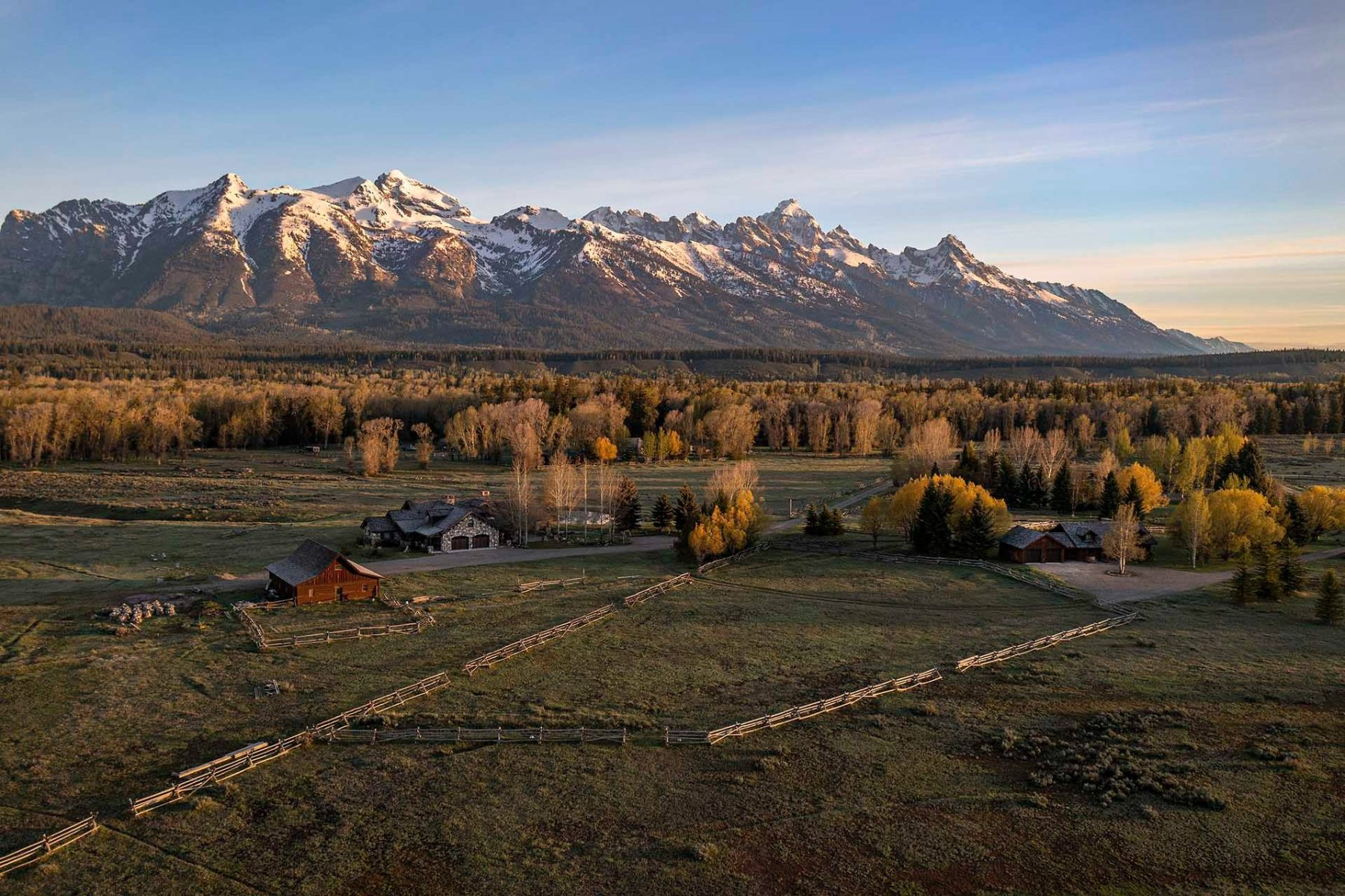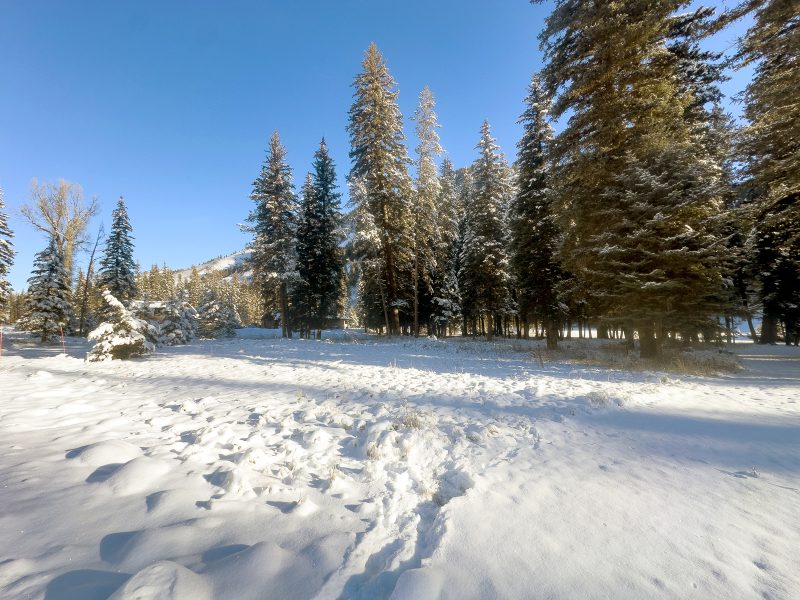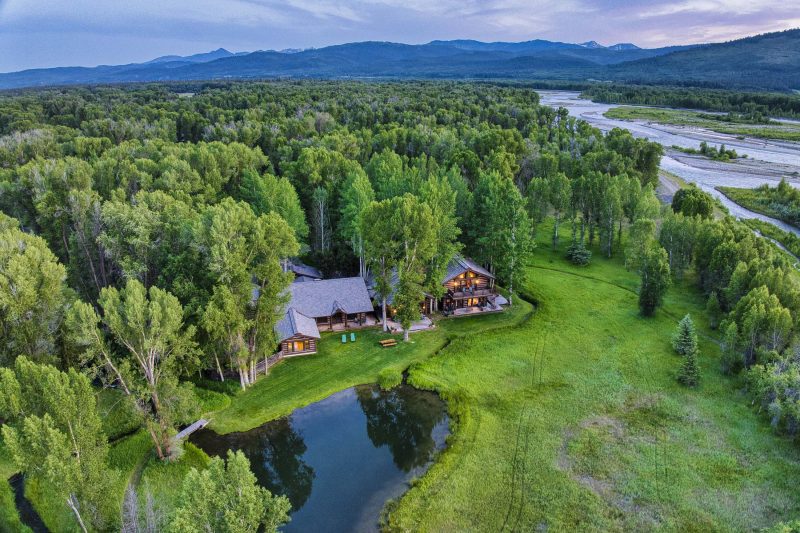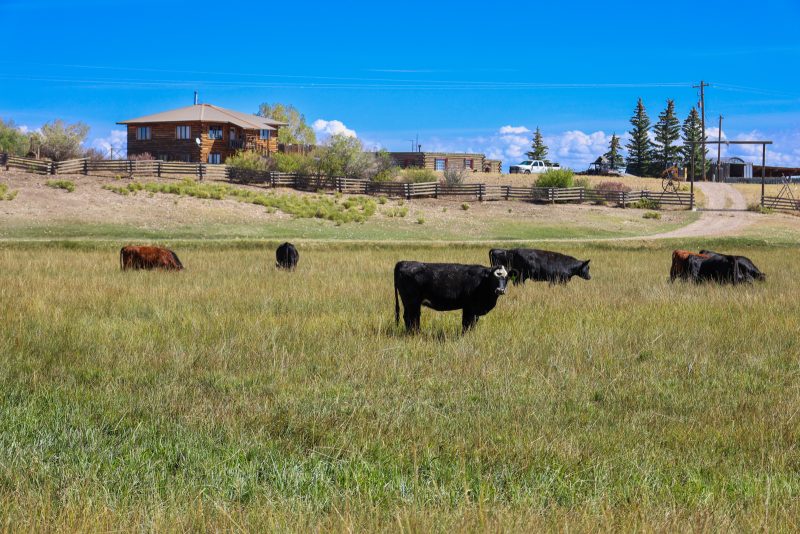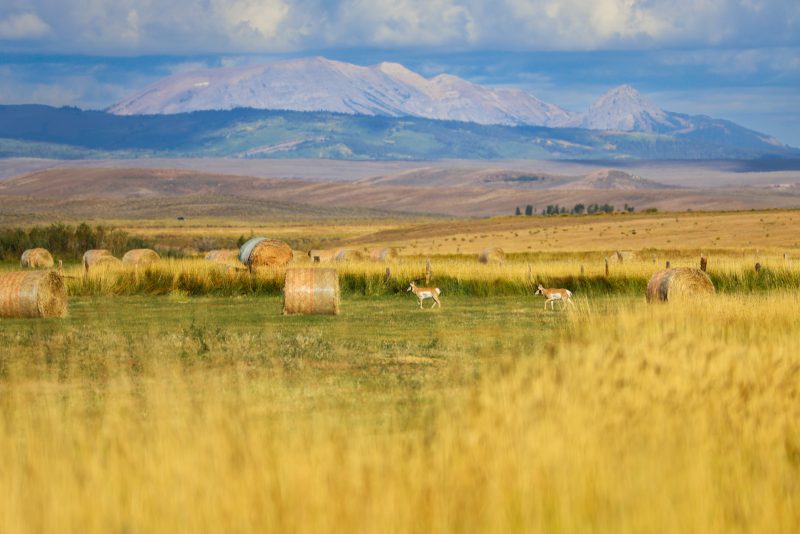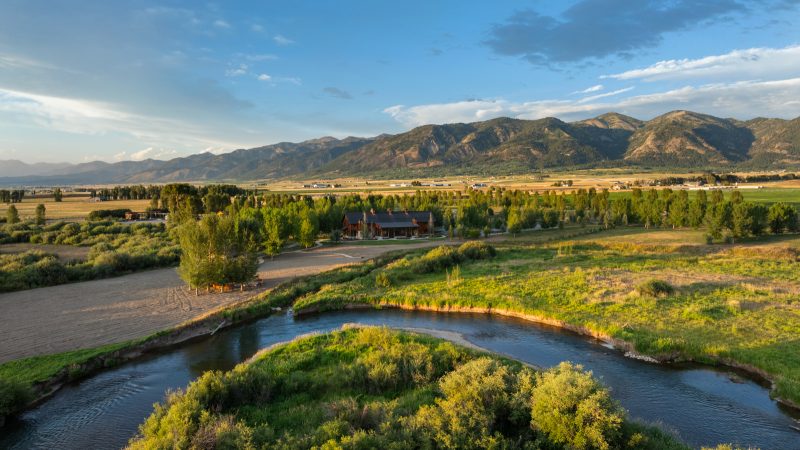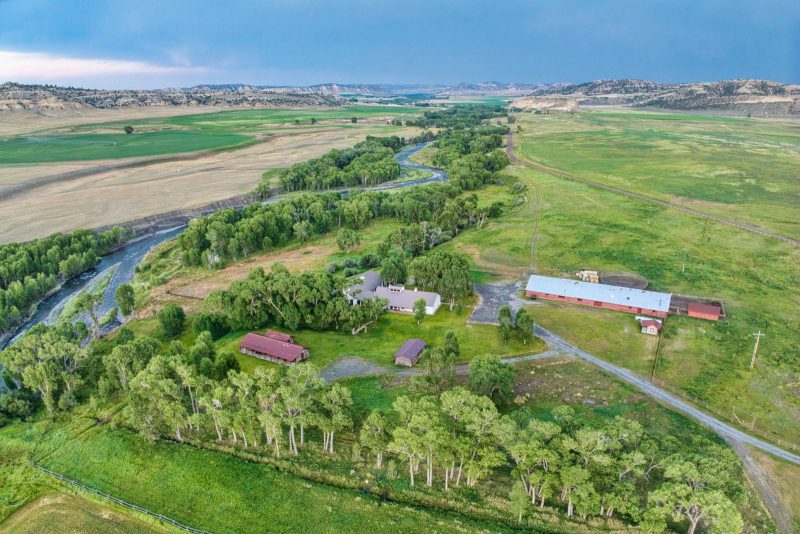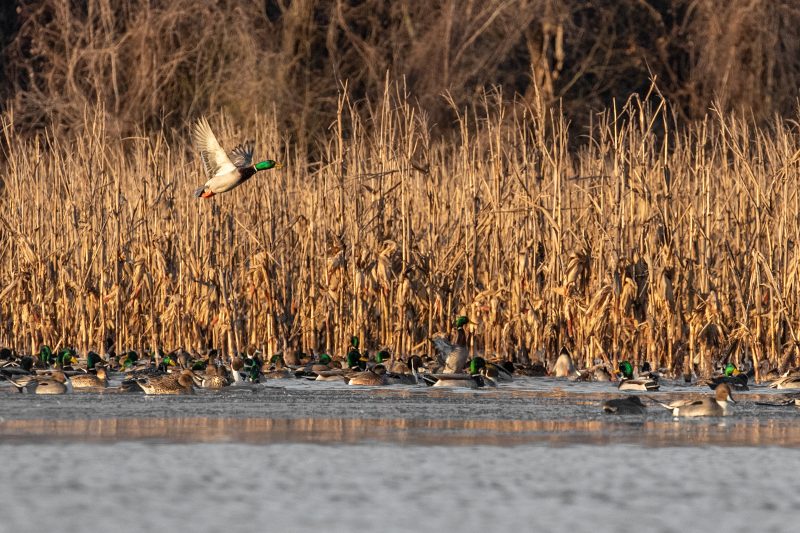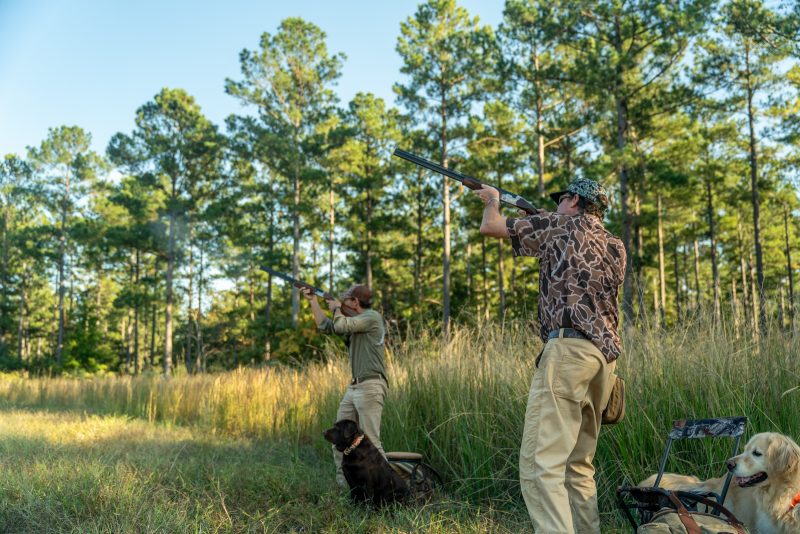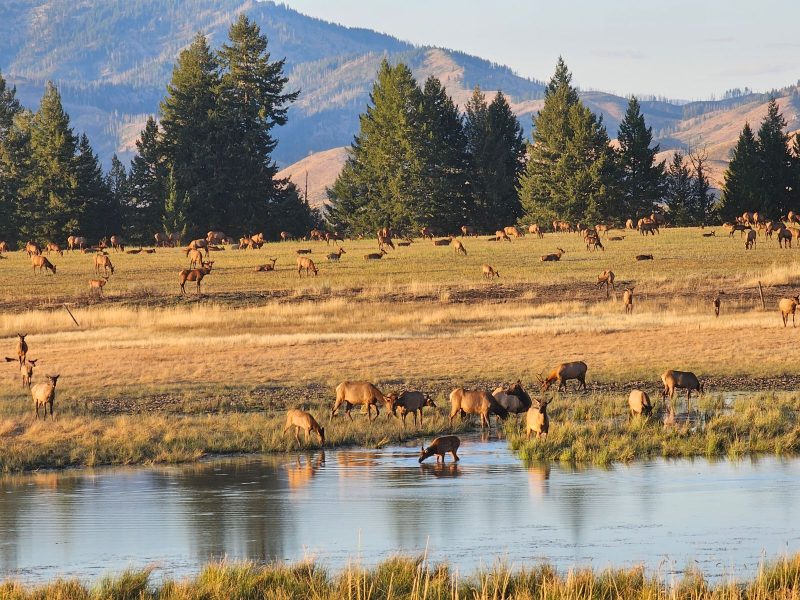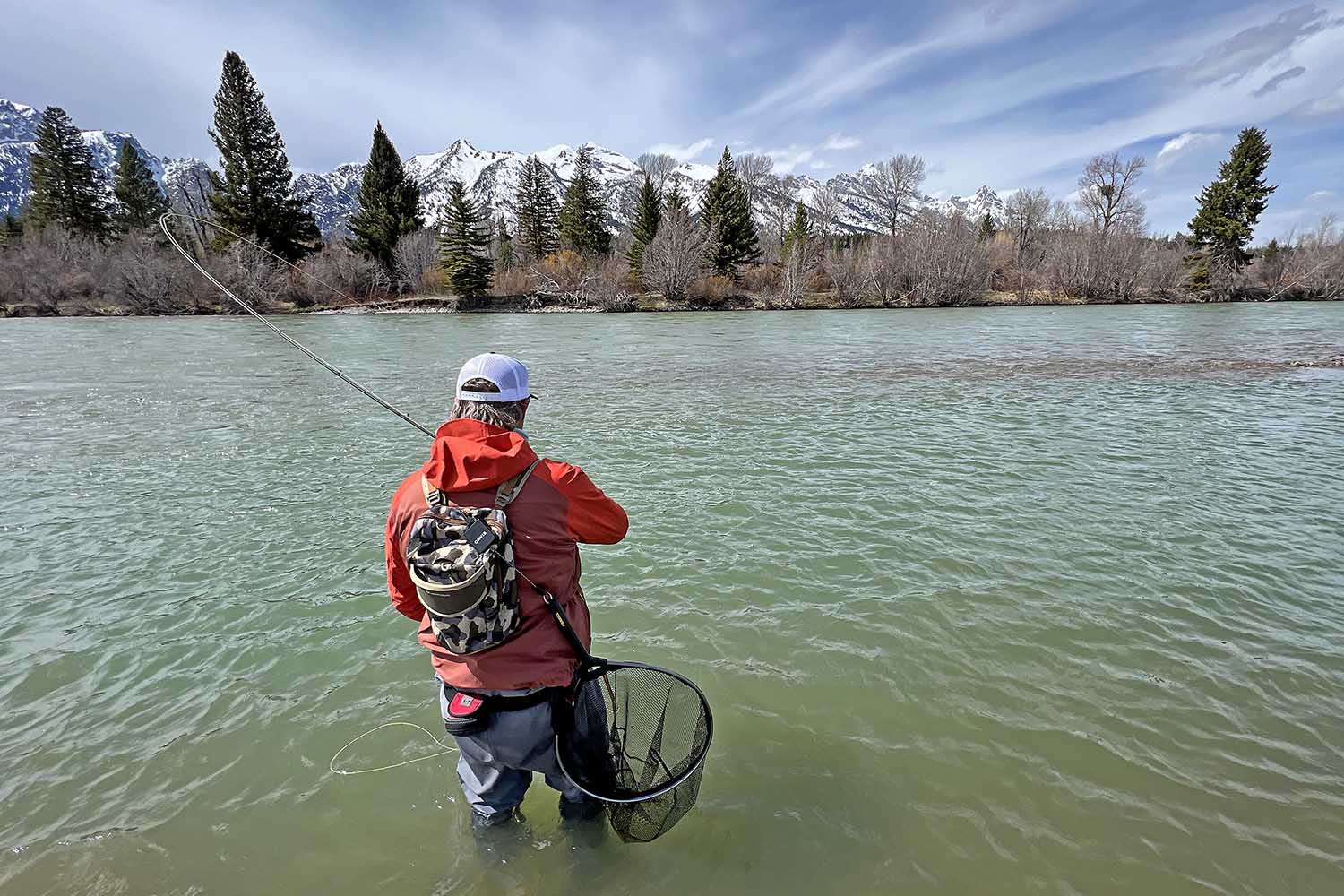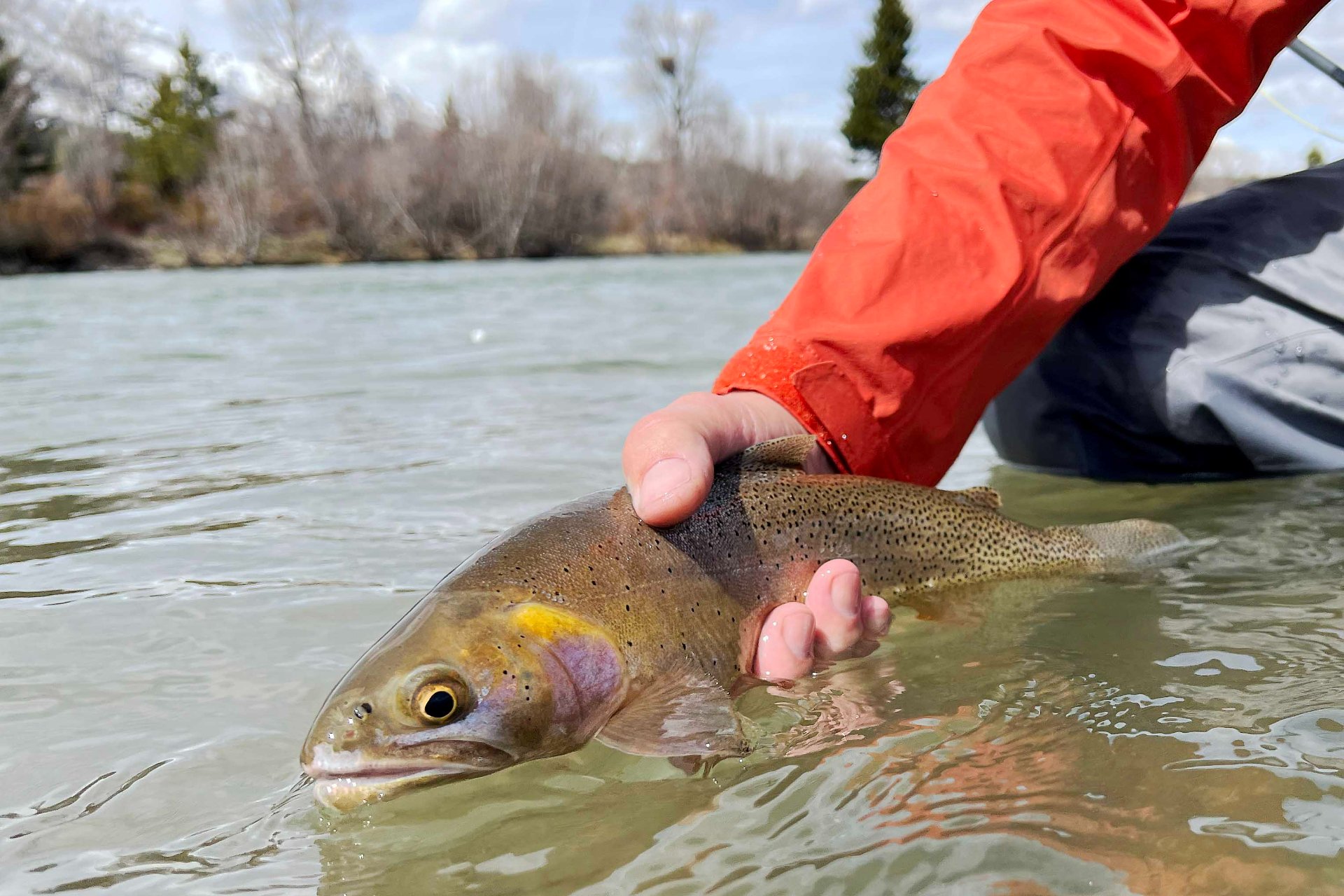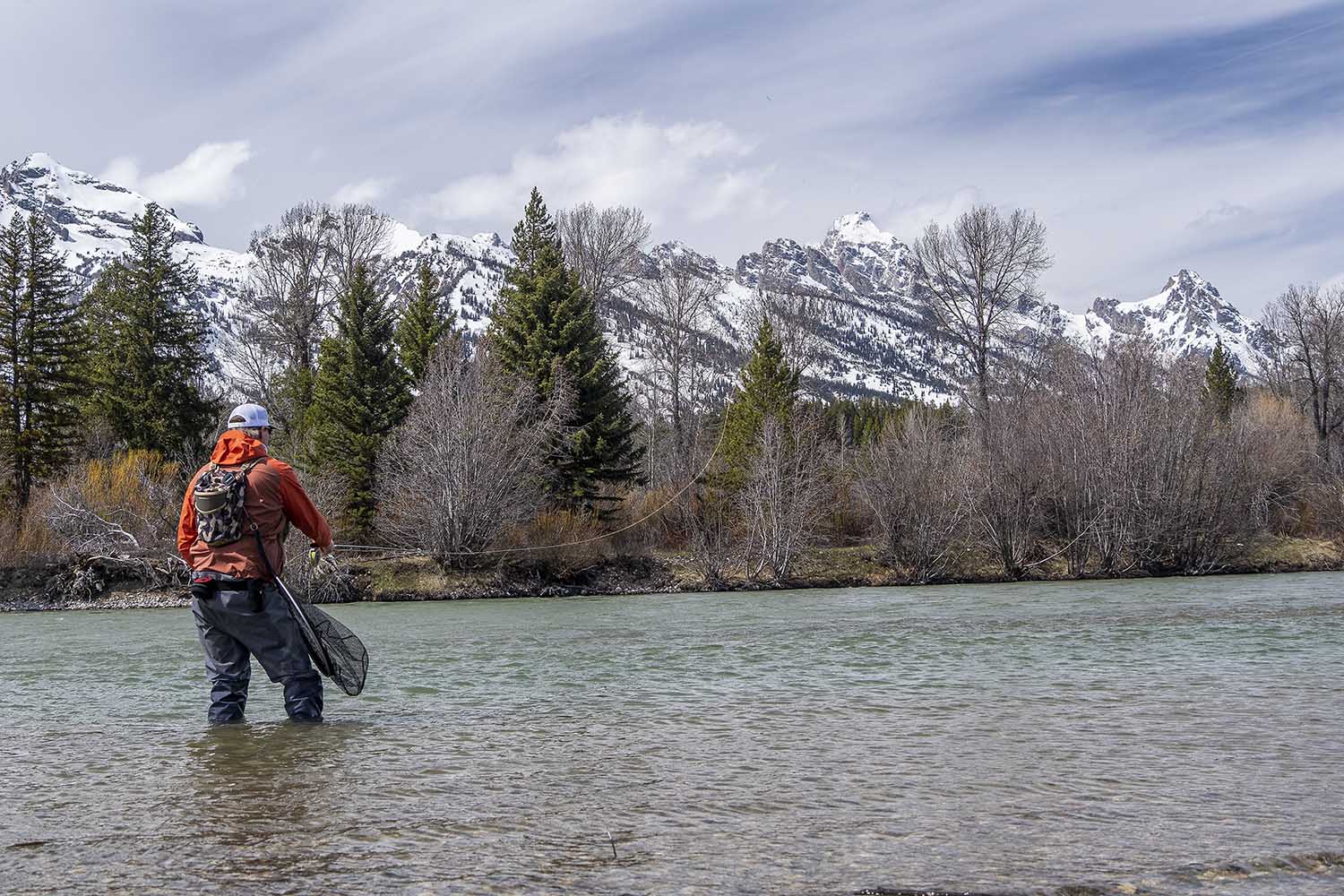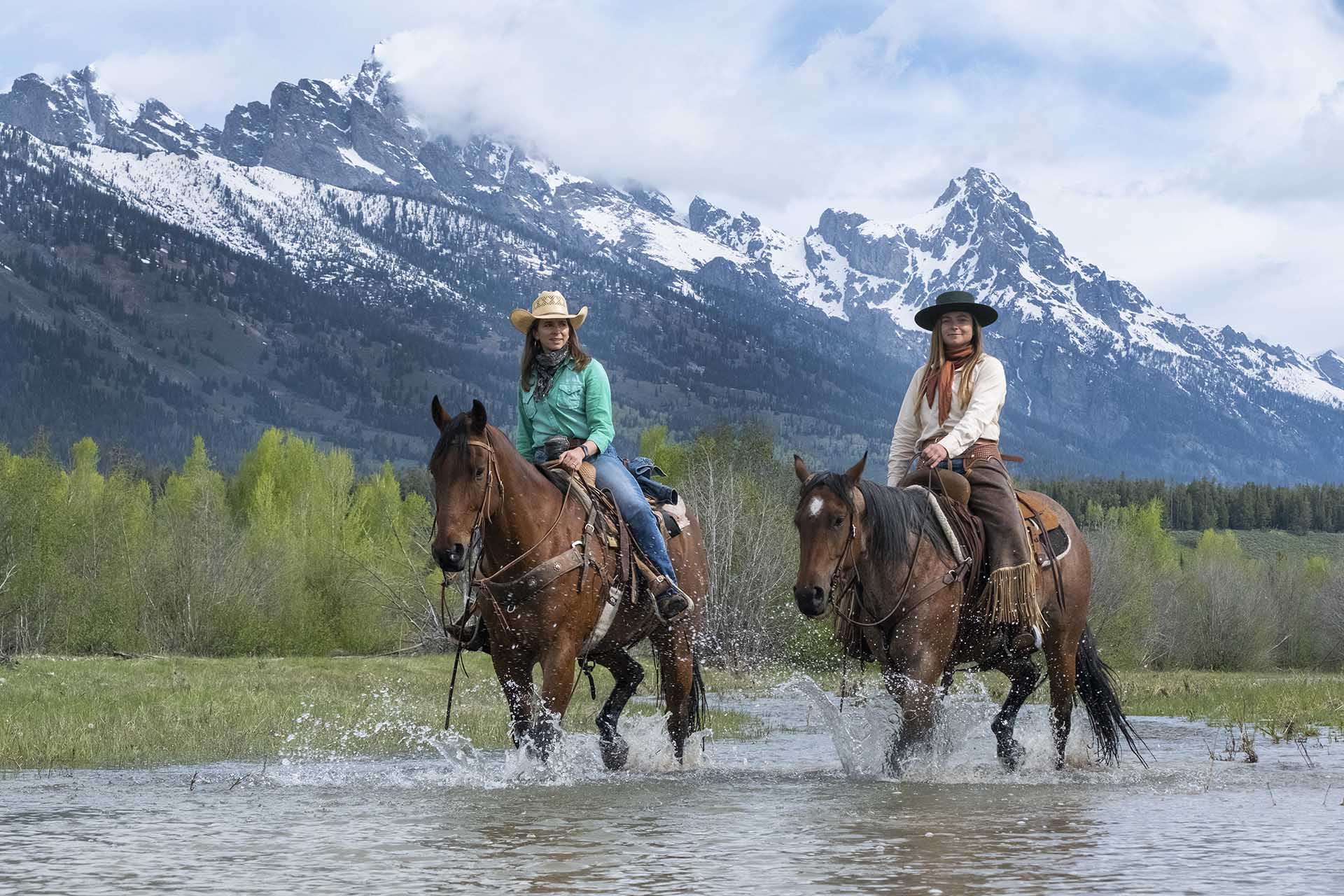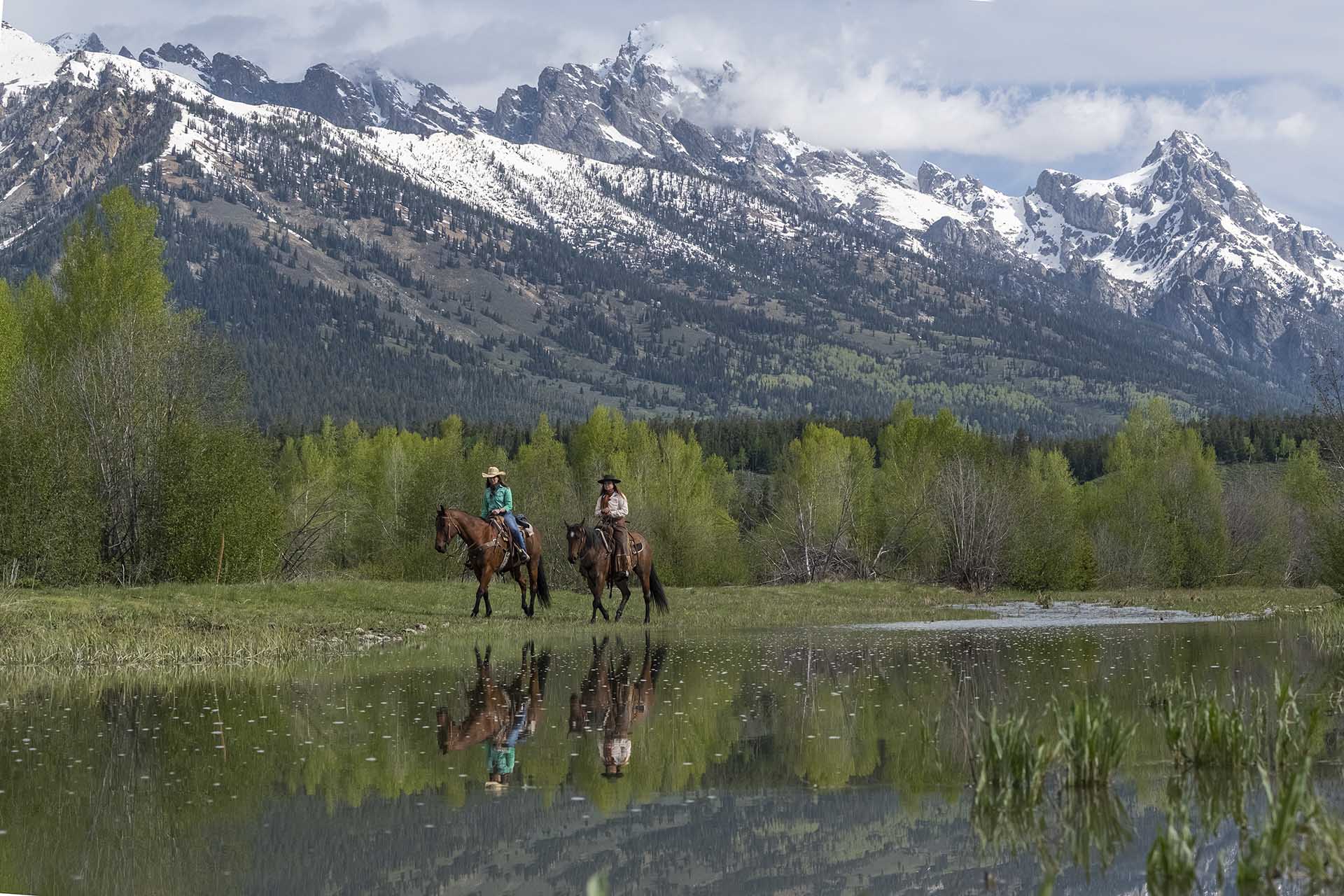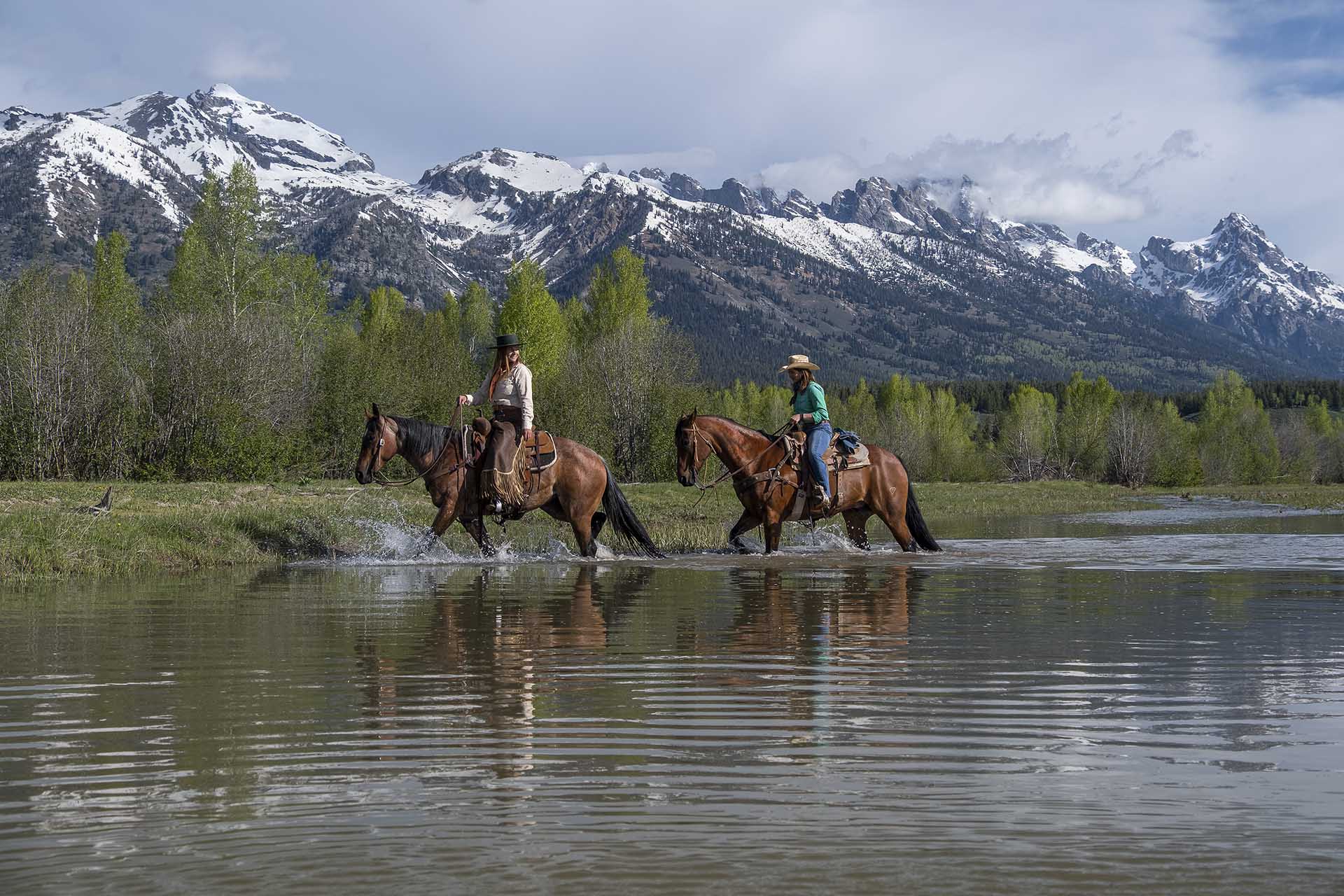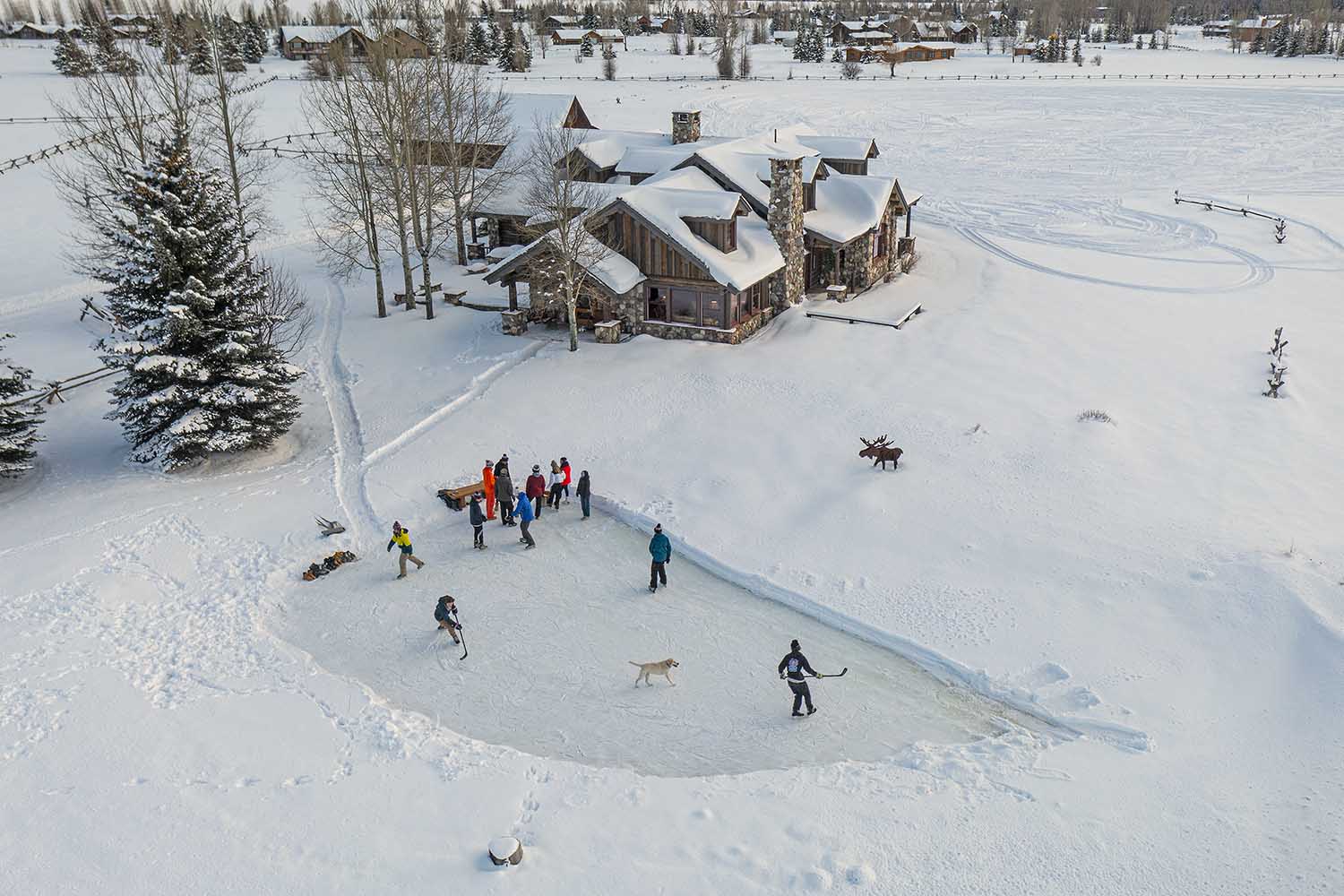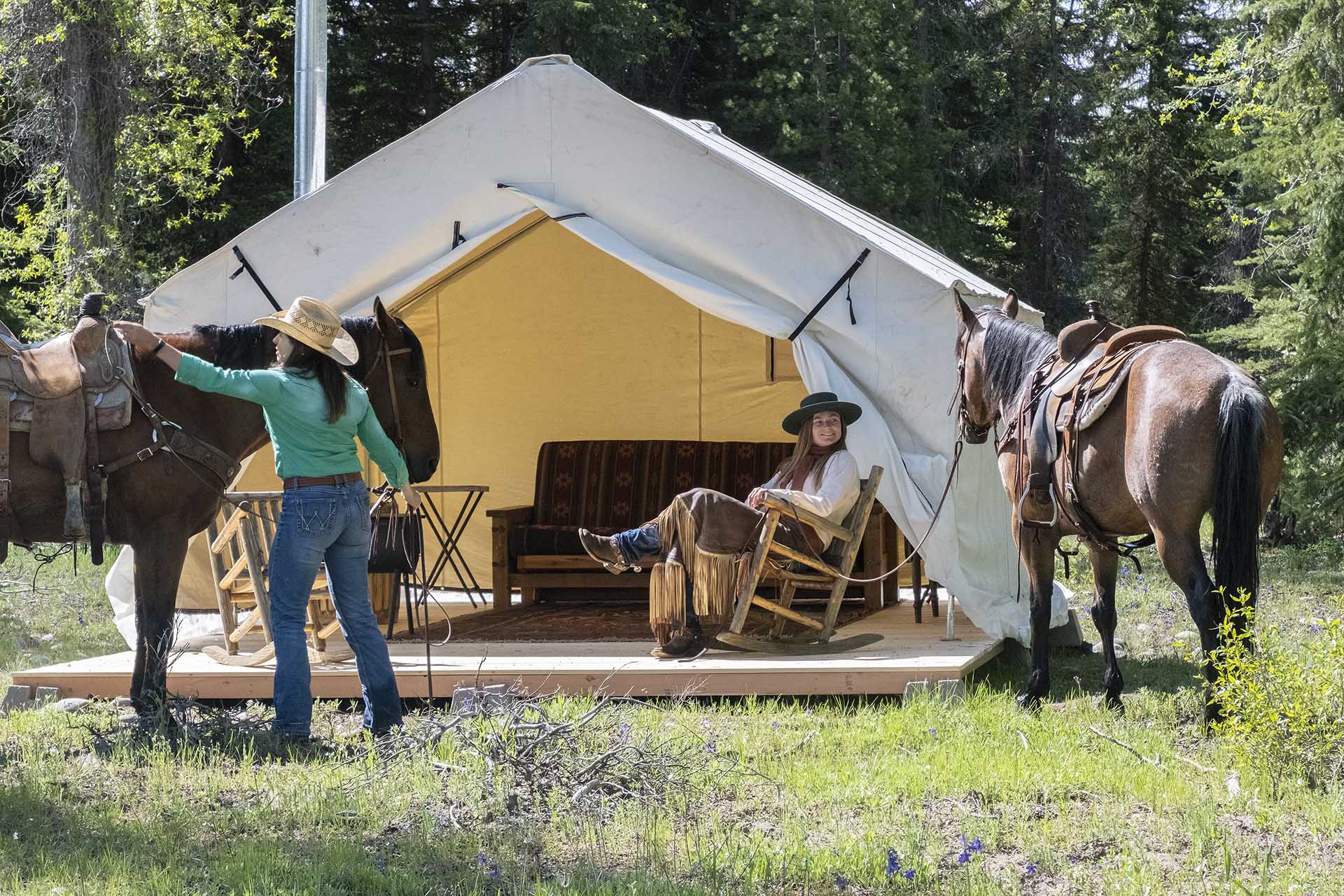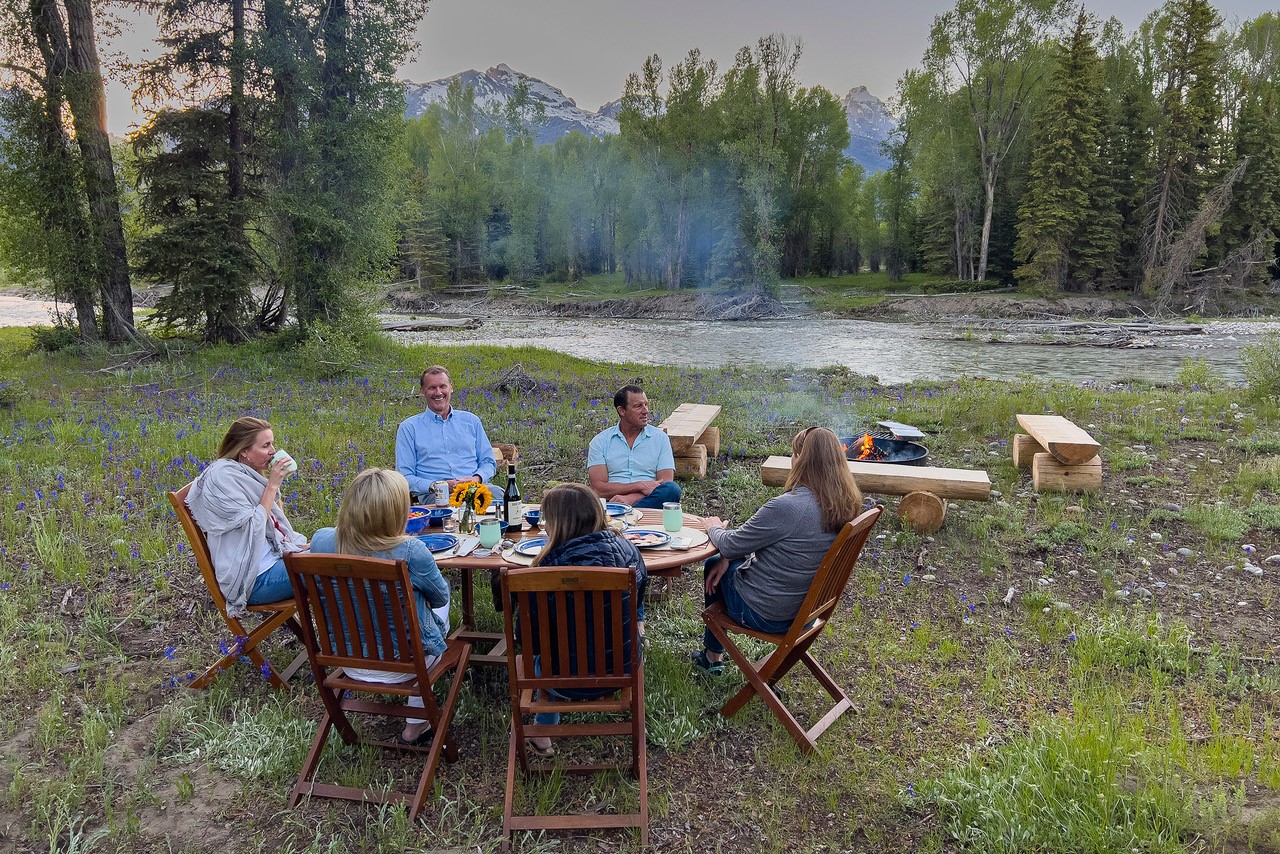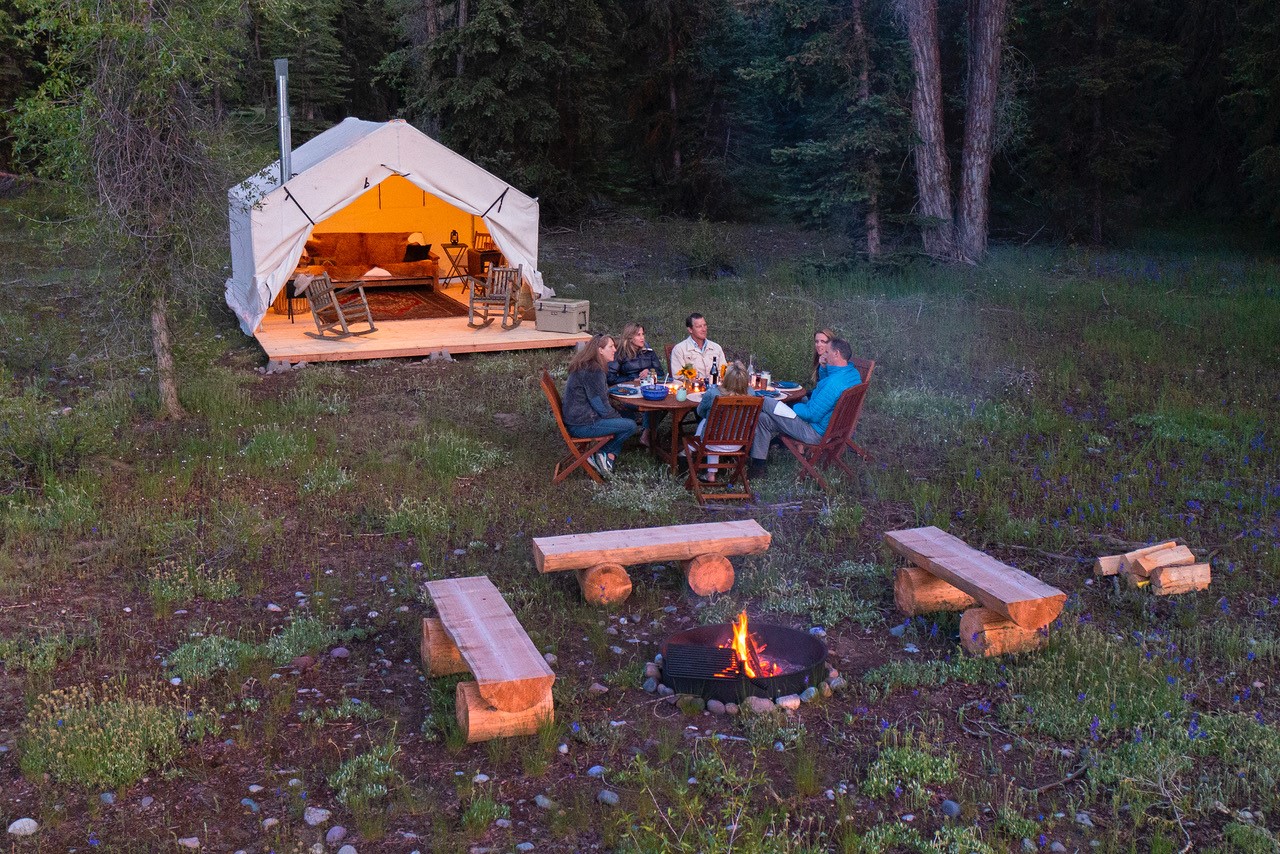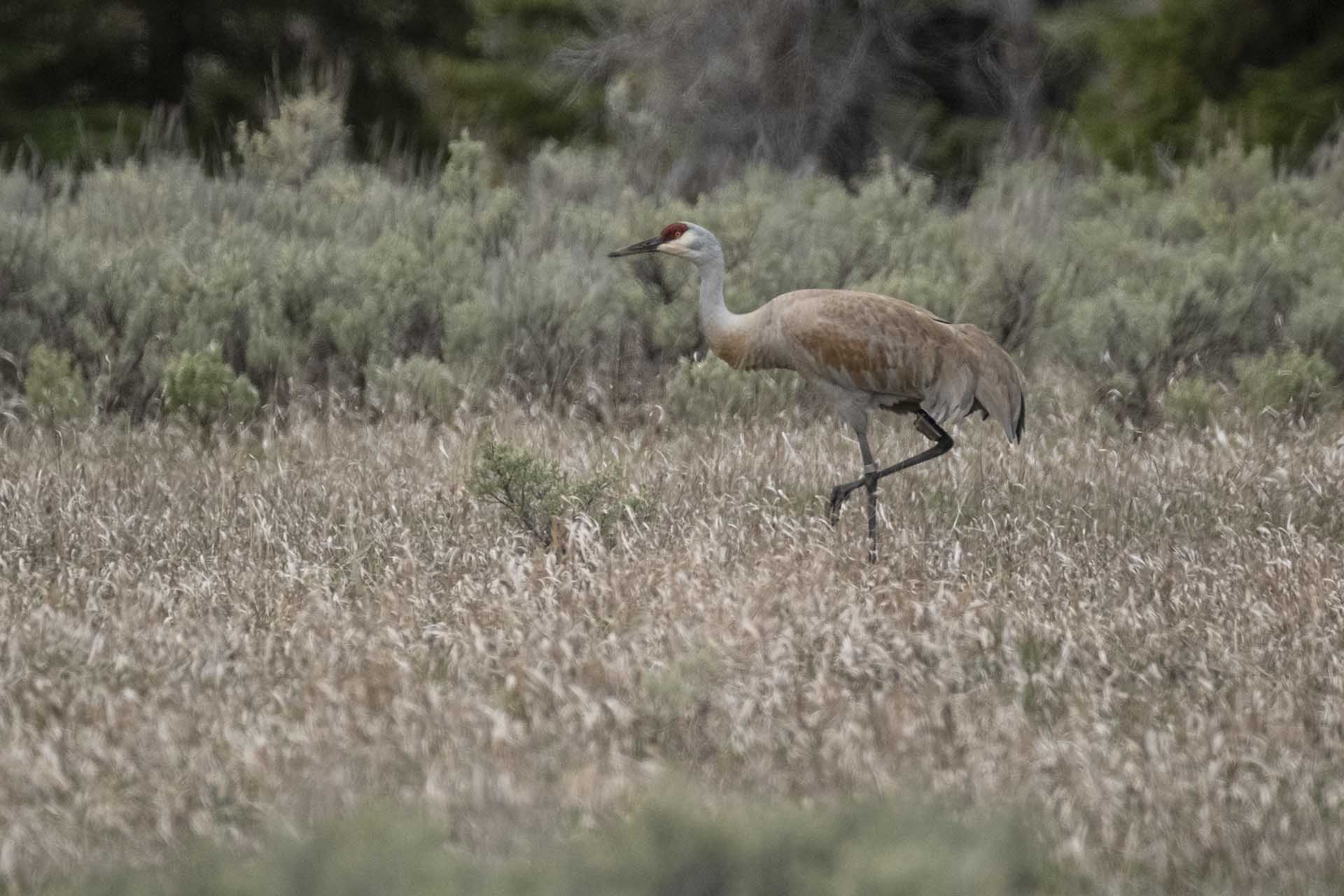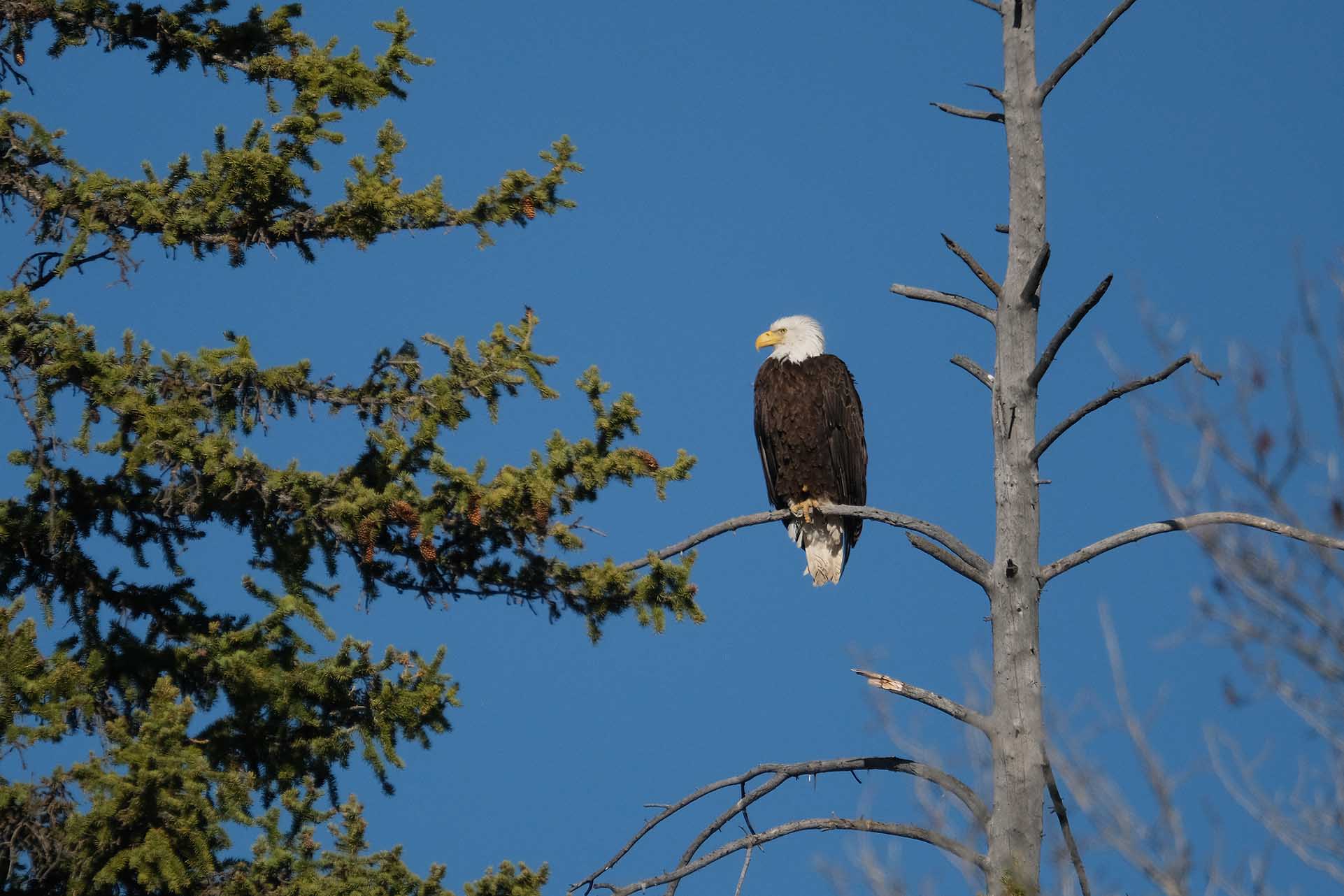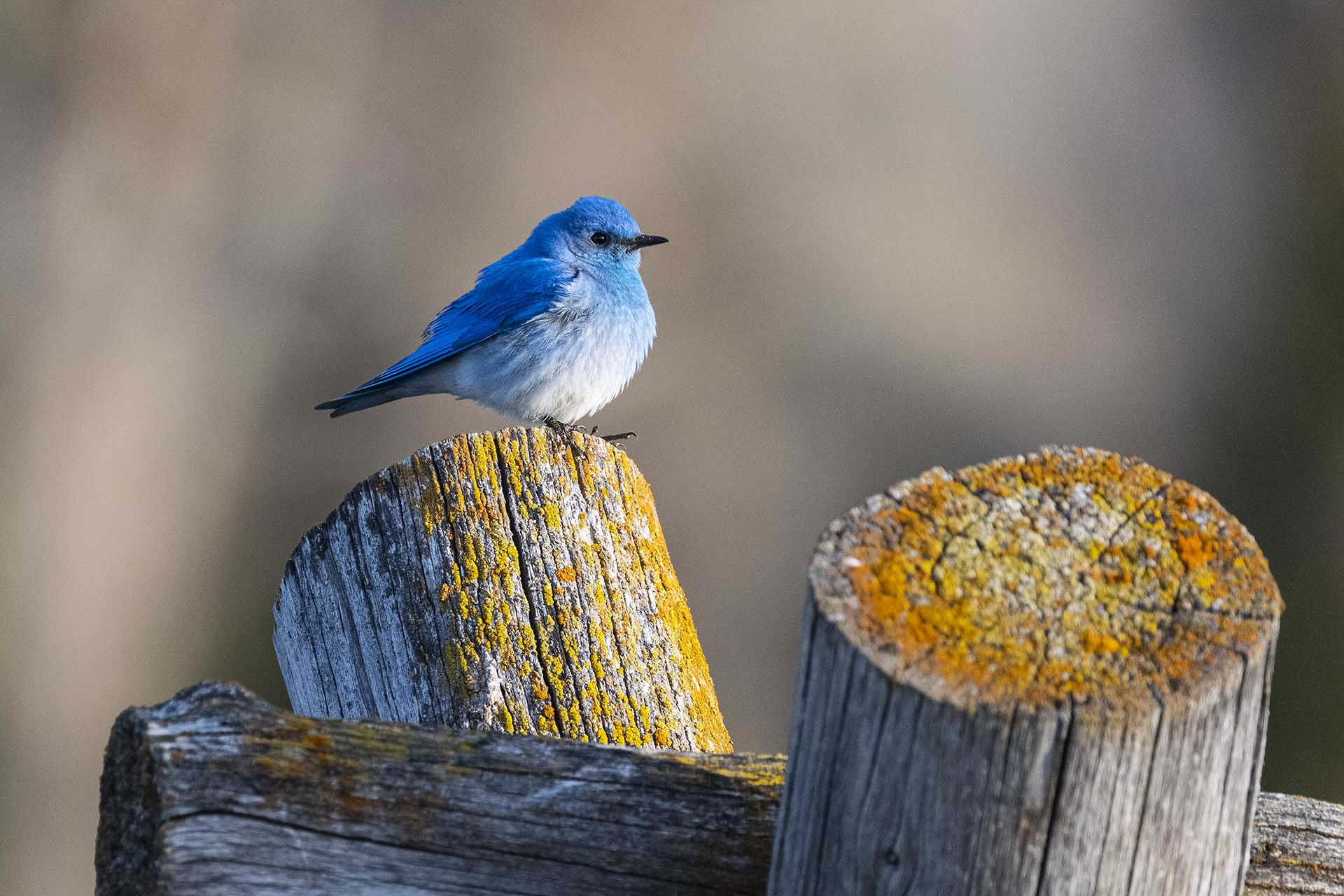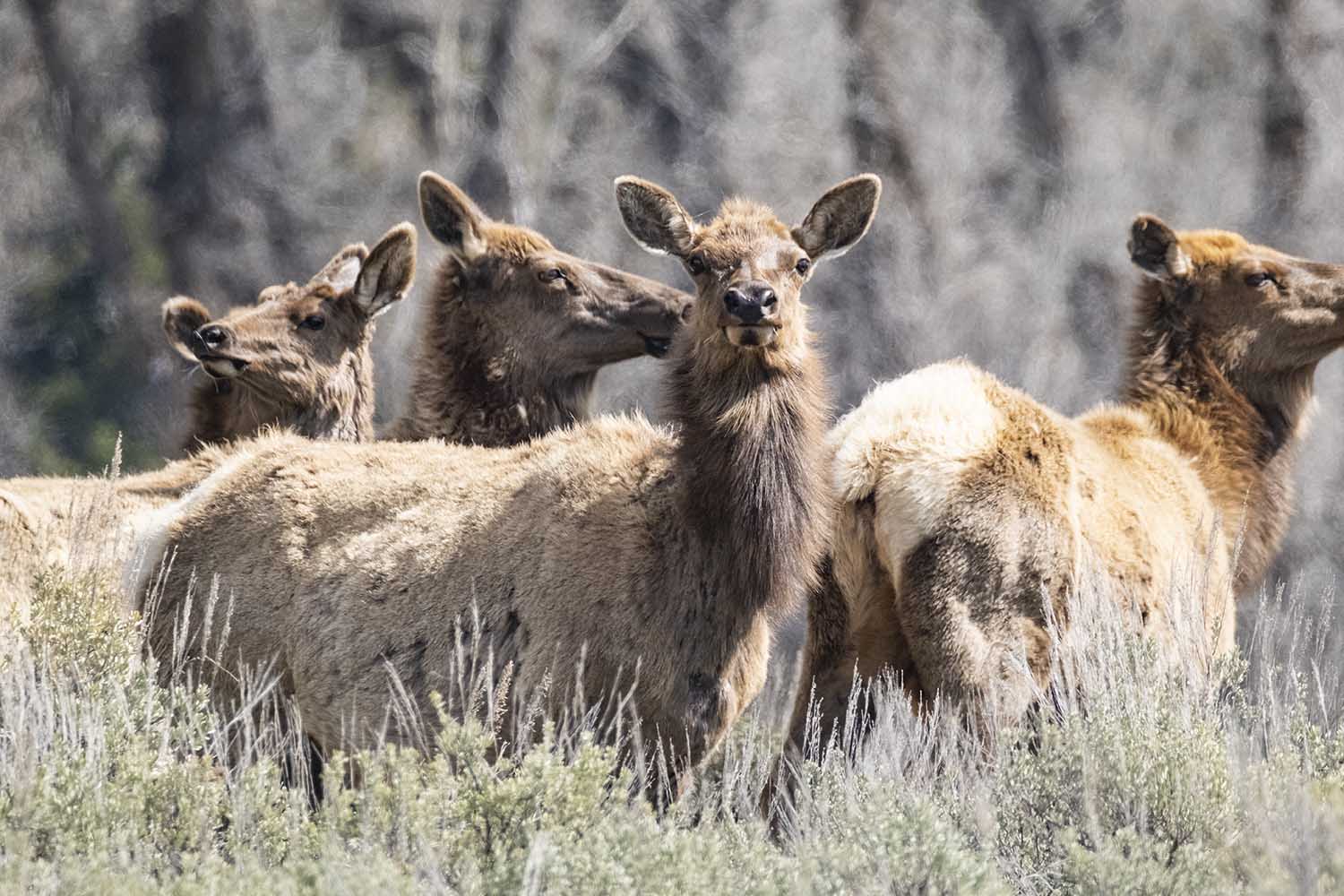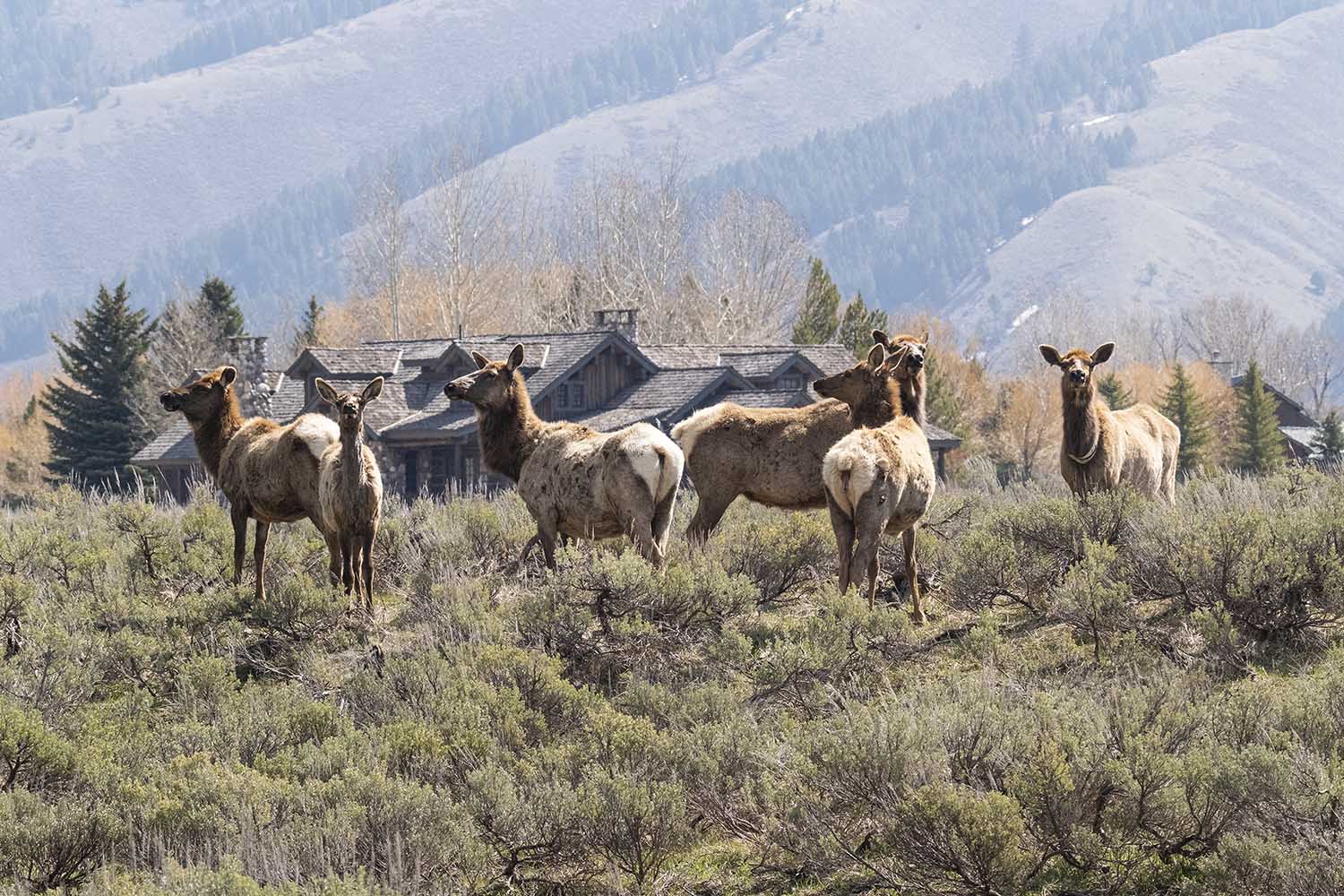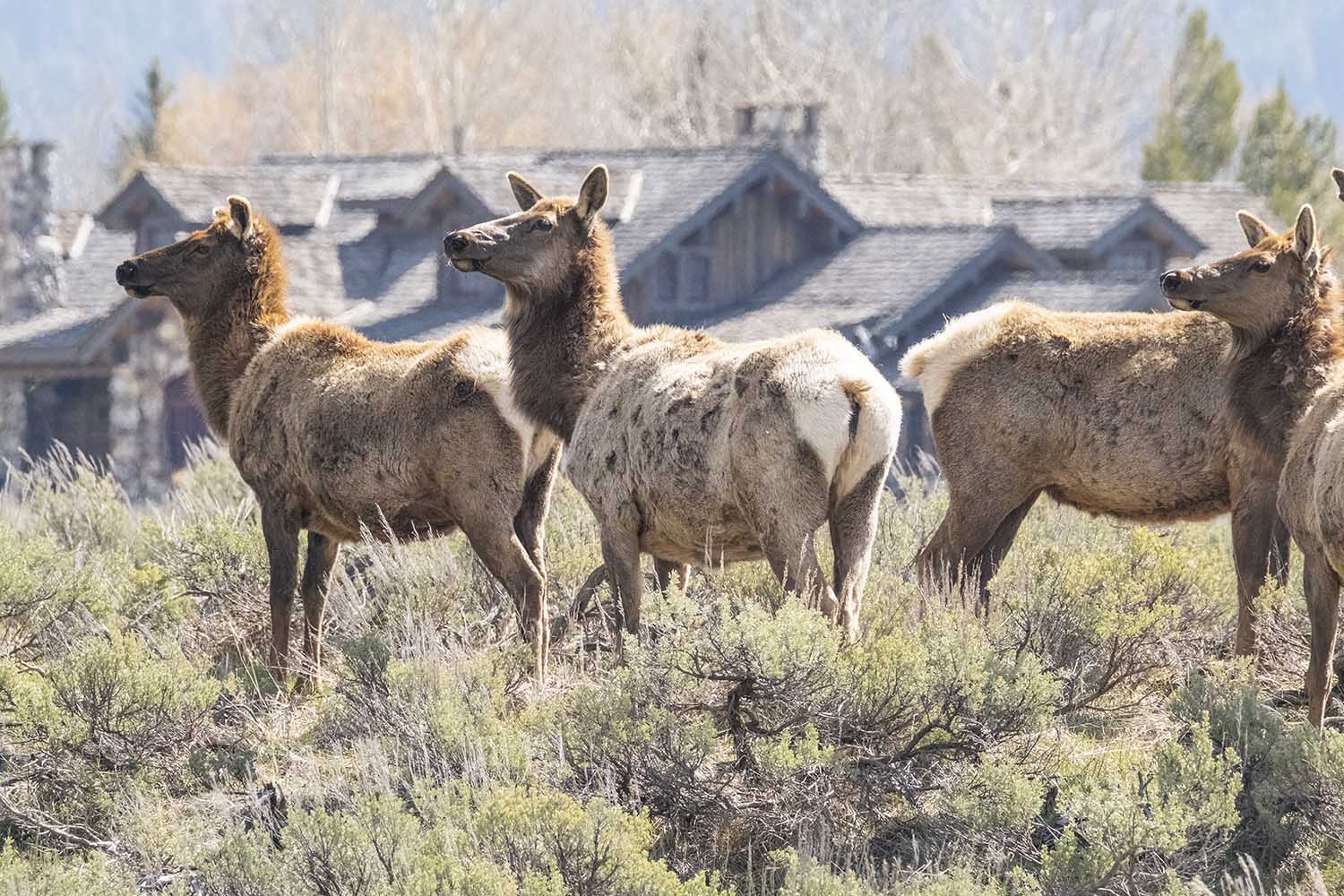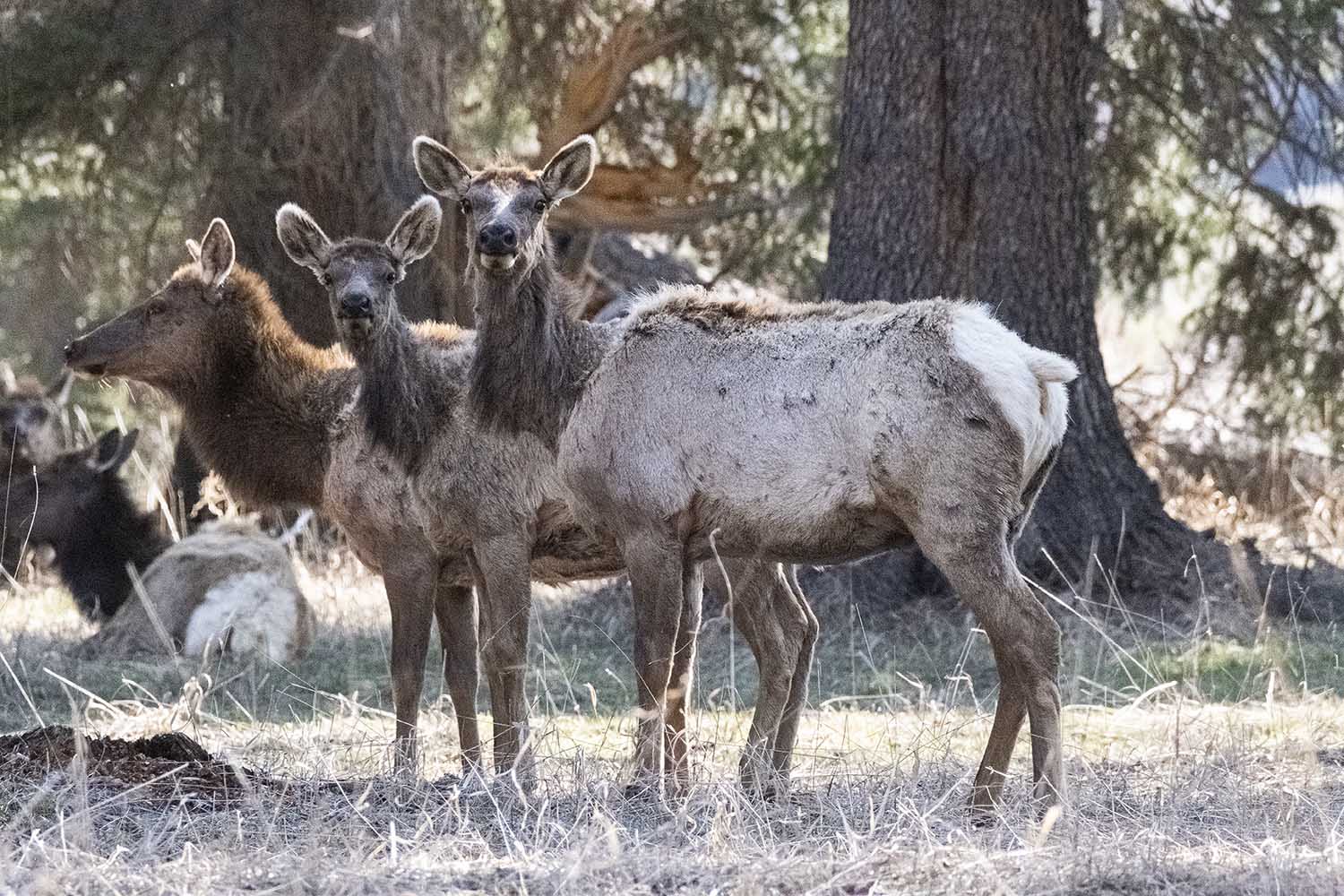Jackson Hole Ranch Jackson, Wyoming
Details & Features
At the foot of the Tetons and bordering Grand Teton National Park, yet a short drive from James Beard-recognized restaurants, the 233-acre Jackson Hole Ranch is unlike any property on the ranch market in Jackson Hole in the last two decades. The ranch’s creeks, ponds, meadows, and ¾ of a mile of the Snake River are a sanctuary for its human owners and more than 100 species of wildlife, including elk, bald eagles, moose, and Snake River fine-spotted cutthroat trout. Each spring, elk seek out the solitude offered by the ranch’s wild lands to calve. The ranch’s owners—stewards helping carry on the legacy of conservation in this remarkable ecosystem—can enjoy this solace, and the awesomeness of being in the shadow of the Tetons, year-round. Jackson Hole Ranch is a national park to call your home.
A National Park to Call Your Own
If the Snake River meandered one bend differently, the 233-acre Jackson Hole Ranch would be part of Grand Teton National Park. If a wildlife-minded couple hadn’t spent the past several decades amassing this acreage and placing more than 96 percent of it under conservation easements, this ranch would be like any other in Jackson Hole. Instead, Jackson Hole Ranch has the same intact habitat, migrating and resident wildlife, and protected views as does Grand Teton National Park, its neighbor to the west. Unlike Grand Teton National Park, which almost four million people visit annually, Jackson Hole Ranch is a private paradise—a place with mountain views in every direction and its own hiking and horseback riding trails, fishing, camping, wildlife watching, stargazing, cross country skiing, and snowshoeing—where you can gather with family and friends and experience the soul of Jackson Hole. Here wildness and solitude are not mere impressions, but reality. But the cowboy cosmopolitan town of Jackson, where the sidewalks are wooden, the Town Square is adorned with arches made from elk antlers, and there are restaurants recognized by the James Beard Foundation, is only 12 miles away. Visible from the living room, the ski slopes of Jackson Hole Mountain Resort are a 25-mile drive. Ten minutes after landing at Jackson Hole Airport, you can be pulling into Jackson Hole Ranch’s driveway. Any property of this size in Jackson Hole is rare; Jackson Hole Ranch is a unicorn.
Multiple Live Waterways and Ponds
Jackson Hole Ranch stuns with its views of the snaggly, glaciated Teton Range, but its heart is the Snake River and three ponds that flow into it. The ranch includes ¾ mile of the river and even more frontage on channels. Between the main river and its side channels are wild islands, themselves cut by braids and spring creeks and alive with the sounds of rustling cottonwood and willow leaves and rushing water. Here you can fish for Snake River fine-spotted cutthroat trout, a species only found in a single 40-mile stretch of the Snake, but only if you don’t get distracted by the views. “Here, the river is completely gorgeous, with uninhibited views of the Tetons,” says Mike Janssen, a head guide with WorldCast Anglers for 28 years. It’s also almost empty. “You’re unlikely to run into anyone else,” he says. “Drift boats will float down in the morning, but if you go later in the day it’s just you and the elk. The benefit of the Jackson Hole Ranch area is that there’s no public access. It’s easy to find solace.” When you can’t make it down to the river, find solace in the private ponds and small creeks around the cabin and farmhouse and surrounding meadows.
Ownership as Stewardship
Jackson Hole is often called “the crucible of conservation.” In 1912, it was in answer to the pleas of locals that the U.S. Congress protected 2,760 acres of wintering ground north of the Town of Jackson for elk. Philanthropist John D. Rockefeller Jr. donated 33,000 acres of land to what we know as Grand Teton National Park. In 1954, in a log cabin only a few miles north of Jackson Hole Ranch, the basis for what would become the Wilderness Act was drafted. Jackson Hole Ranch provides an opportunity for you to join this legacy of stewardship and protect critical wildlife habitat for future generations.
Deep Roots
Between the 1920s and 1950s, visitors came to Jackson Hole from around the world for month-long stays at dude ranches like the Bar BC, the Four Lazy F, Turpin Meadow, and here, Jackson Hole Ranch. While the boundaries of today’s Jackson Hole Ranch have changed since its dude days, the character of the landscape and neighborhood have not. Grand Teton National Park is still just across the Snake River. You can’t get to the ranch without driving dirt roads. Neighbors are community-minded and respectful. The rhythm of days beat around the natural world. And the views are always better on a morning walk with a steaming cup of coffee, from the back of a horse, with a fly rod in hand, or sitting on the front porch or the bank of the Snake River marveling at a sunrise or the pink alpenglow of sunset.
Spaces to Settle In To
Jackson Hole Ranch’s wild lands are what make it most special; its 4,800-square foot main house and a 2,070-square foot cabin were built in service to this landscape and the 1,800-square foot barn, built in the same style as the iconic Moulton Barn several miles to the north, exists to house the equipment and gear you want to explore and enjoy the property. The 5-bedroom, 6-bath main house, a rambling farmhouse built in 2001 using a local materials palette—river rocks and logs—was specifically sited so it didn’t disrupt the foraging grounds of the ranch’s resident herd of elk (spring, summer, and fall). The 4-bedroom, 2-bath cabin was built in 1982 (a 720-square-foot garage was added in 2015) and is exactly what you imagine when you think of a cabin in Jackson Hole: it’s perched on the edge of a pond and faces the Tetons. A separate driveway provides privacy between the cabin and main house. Both houses have spaces with views of the Tetons, Sleeping Indian, and Jackson Hole Mountain Resort. Multiple patios encourage outdoor living at different times of the day—sip coffee in the morning as the sun rises and casts a reflection of the Tetons onto the main pond; at dinner, grill and then dine al fresco on the patio facing the east and Sleeping Indian, tinted pink by sunset alpenglow; for dessert, move to the firepit on the western patio to enjoy the star-lit silhouette of the Tetons. The cabin has a 605-square foot deck facing a pond and the Tetons.
Four of the five bedrooms in the main house have private bathrooms. The fifth bedroom, on the second floor, is a bunk room/entertainment area perfect for cousins or grandkids. The primary and junior suites are in the home’s southern wing and on the ground floor. Also on the ground floor is the open kitchen/dining/living room. Below grade is a 3,800-square-foot basement ideal for storing gear or you can build it out to be a kids’ playroom, home theater, gym, or sauna—or all of these.
Building at Jackson Hole Ranch
The conservation easements on Jackson Hole Ranch that make it a sanctuary for wildlife do not prevent you from making it the sanctuary your family needs. There are opportunities to build new structures including barns, guest houses, and even main houses. The ranch’s 233 acres are split between six parcels that range in size from 3 to 127 acres. Three of the six parcels—the parcels closest to the road—allow for additional building improvements. One of these parcels is currently vacant; another has a 4,800-square foot farmhouse-inspired home built using a locally inspired materials palette (river rocks and log) and a 2,000-square-foot barn; the third has a 2,070-square foot log cabin. “The lots [in this area] are special because they are secluded—off the beaten path and below the bench—close to the park, and, most of all, they have such dramatic views to the Grand and the Teton range,” says Larry Berlin, the founder and principal at Jackson-based Berlin Architects, which has designed homes in this neighborhood.
Making the Most of the Ranch’s Wild Lands
Go cross country skiing, snowmobiling, hiking, fly fishing, horseback riding, ice skating and camping without leaving your property. (If you ski or hike the ranch’s perimeter, it’s more than 3 miles.) Hang a hammock between cottonwoods on the banks of the Snake River and read or nap. Make s’mores over a fire on an island in the middle of the Snake River. Practice casting—and maybe teach the kids or visiting friends how to fish—in one of the ranch’s ponds stocked with cutthroat trout. In the winter, when these ponds are frozen, play hockey in the shadow of the Tetons. Set up a telescope in the front yard and, thanks to the ranch’s location next to Grand Teton National Park, enjoy some of the darkest skies in the country. Four out of five people in the U.S. live somewhere so light polluted they cannot see the Milky Way. The galaxy spreads across the nighttime sky above Jackson Hole Ranch like gauze; no telescope needed. Become an expert on the more than 300 species of birds that have been seen around the ranch, or take up wildlife tracking for the fun of it. The recreation opportunities at Jackson Hole Ranch are only limited by your imagination.
Where Wildlife Are the Nearest Neighbors
While you don’t have to share this sanctuary with the crowds that visit Grand Teton National Park, you do share it with the same multitude of species that live in the park. In the spring, summer, and fall, a herd of more than 600 elk move onto Jackson Hole Ranch after wintering on the nearby National Elk Refuge; the ranch’s secluded riparian areas are essential elk calving grounds. A nesting pair of bald eagles watch over the property—and you can watch them back while sitting in front of the fireplace, or while enjoying an evening cocktail at the outdoor fire pit. Have you ever seen the elegant mating dance of sandhill cranes? In the late spring, couples court in the sagebrush meadow in front of the main house. Black and grizzly bears, moose, and wolves, among other species, also wander through and depend on the ranch’s protected habitat. According to the Jackson Hole Land Trust, 80 percent of the vertebrate species and all of the invertebrate species that live in the Greater Yellowstone Ecosystem live on and around Jackson Hole Ranch. This makes the property a treat for the ears as much as the eyes—the soundtrack of the Jackson Hole Ranch includes the high-pitched peals of bald eagles, the throaty trumpets of sandhill cranes and Trumpeter swans, the hoots of great gray owls, and the other-worldly bugling of elk.
- Borders Grand Teton National Park
- Unparalleled Grand Teton views
- 15 Minutes to Jackson Hole Town Square
- Private Snake River access
Wyoming
Ranches for Sale in Wyoming The Equality State has been rooted in ranching since becoming a state in 1890. So much has changed since then, but when a ranch experience happens for the first time, it seems that little time has passed since the turn of the 19th century. From Cheyenne to Pinedale; Wyoming offers a plethora of income-producing cattle ranches for sale and farms for someone looking for an investment property. Many of these ranches for sale in Wyoming include BLM leases, United States Forest Service agreements for cattle grazing and lease agreements with neighboring ranchers or farmers. Harvesting upland birds and big game animals are another ...
View All Wyoming PropertiesLandowner Insights
2025 Waterfowl and Upland Bird Properties
Bird hunting season stirs memories of early mornings, handcrafted blinds, and the thrill of the shot. Whether you’re pursuing mallards over flooded timber...
Welcoming Fall to the South
Fall arrives gently in the South, bringing cooler mornings, golden fields, and timeless traditions rooted in the land. From dove season to family gatherings,...
2025 Big Game Hunting Properties
With the change of seasons come crisp mornings and shorter days. The high country comes alive – elk slip through dark timber, mule deer step into open...



